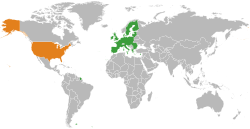
Transatlantic Trade and Investment Partnership

The Transatlantic Trade and Investment Partnership (TTIP) is a proposed trade agreement between the European Union and the United States, with the aim of promoting trade and multilateral economic growth. According to Karel de Gucht, European Commissioner for Trade between 2010 and 2014, the TTIP is the largest bilateral trade initiative ever negotiated, not only because it involves the two largest economies in the world but also 'because of its potential global reach in setting an example for future partners and agreements'. Negotiations were halted by President Donald Trump, who then initiated a trade conflict with the EU. Trump and the EU declared a truce of sorts in July 2018, resuming talks that appeared similar to TTIP. The reports on the ongoing negotiations and the contents of the negotiated TTIP proposals are classified from the public, and can be accessed only by authorised persons. Multiple leaks of proposed TTIP contents into the public caused controversy. The European Commission says that the TTIP would boost the EU's economy by €120 billion, the US economy by €90 billion and the rest of the world by €100 billion. According to Anu Bradford, law professor at Columbia Law School, and Thomas J. Bollyky of the Council on Foreign Relations, TTIP aims to 'liberalise one-third of global trade' and could create millions of new jobs. A Guardian article by Dean Baker of the US thinktank Center for Economic and Policy Research argued that the economic benefits per household would be relatively small. According to a European Parliament report, impacts on labour conditions range from job gains to job losses, depending on economic model and assumptions used for predictions. The agreement has been criticized and opposed by some unions, charities, NGOs and environmentalists, particularly in Europe. The Independent describes common criticisms of TTIP as 'reducing the regulatory barriers to trade for big business, things like food safety law, environmental legislation, banking regulations and the sovereign powers of individual nations', or more critically as an 'assault on European and US societies by transnational corporations'. The Guardian noted the criticism of TTIP's 'undemocratic nature of the closed-door talks', 'influence of powerful lobbyists', TTIP's potential ability to 'undermine the democratic authority of local government', and described it as 'the most controversial trade deal the EU has ever negotiated'. German economist Max Otte argued that by putting European workers into direct competition with Americans (and in effect because of the North American Free Trade Agreement with Mexicans and Canadians), TTIP would negatively impact the European social models. An EU direct democracy mechanism, the European Citizens' Initiative, which enables EU citizens to call directly on the European Commission to propose a legal act, acquired over 3.2 million signatures against TTIP and CETA within a year. Economic barriers between the EU and the United States are relatively low, not only due to long-standing membership in the World Trade Organization (WTO) but also recent agreements such as the EU–US Open Skies Agreement and work by the Transatlantic Economic Council. The European Commission claims that passage of a trans-Atlantic trade pact could boost overall trade between the respective blocs by as much as 50%. Economic gains from a Trade Treaty were predicted in the joint report issued by the White House and the European Commission. Some form of Transatlantic Free Trade Area had been proposed in the 1990s and later in 2006 by German Chancellor Angela Merkel in reaction to the collapse of the Doha world trade talks. However, protectionism on both sides may be a barrier to any future agreement. It was first initiated in 1990, when, shortly after the end of the Cold War, with the world no longer divided into two blocs, the European Community (12 countries) and the US signed a 'Transatlantic Declaration'. This called for the continued existence of the North Atlantic Treaty Organization, as well as for yearly summits, biannual meetings between ministers of State, and more frequent encounters between political figures and senior officials. Subsequent initiatives taken by the European deciders and the US government included: in 1995, the creation of a pressure group of business people, the Transatlantic Business Dialogue (TABD) by public authorities on both sides of the Atlantic; in 1998, the creation of an advisory committee, the Transatlantic Economic Partnership; in 2007, the creation of the Transatlantic Economic Council, in which representatives from firms operating on both sides of the Atlantic meet to advise the European Commission and the US government – and finally, in 2011, the creation of a group of high-level experts whose conclusions, submitted on 11 February 2013, recommended the launching of negotiations for a wide-ranging free-trade agreement. On 12 February 2013, President Barack Obama called in his annual State of the Union address for such an agreement. The following day, EU Commission President Jose Manuel Barroso announced that talks would take place to negotiate the agreement.
